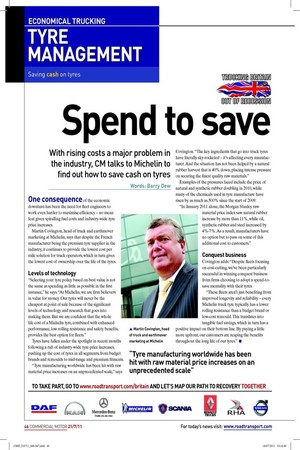Spend to save
Page 41

If you've noticed an error in this article please click here to report it so we can fix it.
With rising costs a major problem in the industry, CM talks to Michelin to find out how to save cash on tyres
Words: Barry Dew One consequence of the economic
downturn has been the need for leet engineers to work even harder to maximise eficiency – no mean feat given spiralling fuel costs and industry-wide tyre price increases.
Martin Covington, head of truck and earthmover marketing at Michelin, says that despite the French manufacturer being the premium tyre supplier in the industry, it continues to provide the lowest cost per mile solution for truck operators, which in turn gives the lowest cost of ownership over the life of the tyres.
Levels of technology
“Selecting your tyre policy based on best value is not the same as spending as little as possible in the irst instance,” he says. “At Michelin, we are irm believers in value for money. Our tyres will never be the cheapest at point of sale because of the signiicant levels of technology and research that goes into making them. But we are conident that the whole life cost of a Michelin tyre, combined with enhanced
performance, low rolling resistance and safety beneits, ▲ Martin Covington, head provides the best option for leets.” of truck and earthmover Tyres have fallen under the spotlight in recent months marketing at Michelin
following a raft of industry-wide tyre price increases, pushing up the cost of tyres in all segments, from budget brands and remoulds to mid-range and premium itments.
“Tyre manufacturing worldwide has been hit with raw material price increases on an unprecedented scale,” says Covington. “The key ingredients that go into truck tyres have literally sky-rocketed – it’s affecting every manufacturer. And the situation has not been helped by a natural rubber harvest that is 40% down, placing intense pressure on securing the inest quality raw materials.” Examples of the pressures faced include the price of natural and synthetic rubber doubling in 2010, while many of the chemicals used in tyre manufacture have risen by as much as 500% since the start of 2009.
“In January 2011 alone, the Morgan Stanley raw material price index saw natural rubber increase by more than 11%, while oil, synthetic rubber and steel increased by 4%-7%. As a result, manufacturers have no option but to pass on some of this additional cost to customers.”
Conquest business
Covington adds: “Despite leets focusing on cost-cutting, we’ve been particularly successful in winning conquest business from irms choosing to adopt a spend-tosave mentality with their tyres.
“These leets aren’t just beneiting from improved longevity and reliability – every Michelin truck tyre typically has a lower rolling resistance than a budget brand or low-cost remould. This translates into tangible fuel savings, which in turn has a positive impact on their bottom line. By paying a little more upfront, our customers are reaping the beneits throughout the long life of our tyres.” ■














































